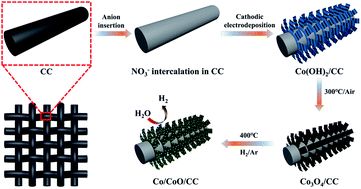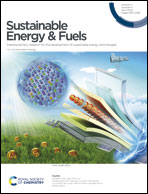A Co/CoO hybrid rooted on carbon cloth as an efficient electrocatalyst for the hydrogen evolution reaction in alkaline solution†
Abstract
The development of low-cost electrocatalysts with high performance toward the hydrogen evolution reaction (HER) is crucial for large-scale and clean hydrogen production. Herein, we report a facile synthesis of Co/CoO hybrids with oxygen vacancies on carbon cloth (CC) via the calcination treatment of a Co3O4 precursor in a reducing atmosphere (H2/Ar). Moreover, to avoid delamination and cracks during heat treatment and catalyst abscission during the HER test, the precursor of Co(OH)2 was stabilized on CC by the anion intercalation method, resulting in robust adhesion between the film and substrate. The as-prepared Co/CoO hybrids rooted on the CC substrate possessed good charge transfer properties, favorable kinetics, abundant active sites, and robust adhesion. A suitable reducing atmosphere was crucial for high catalytic activity. By optimizing, the sample obtained in a 30% H2/Ar atmosphere (Co/CoO-30) possessed an optimal balance between Co/CoO and oxygen vacancies, exhibiting optimum HER performance with the smallest overpotential of 158 mV at 10 mA cm−2 and Tafel slope of 68.1 mV dec−1 as well as good stability, operating for at least 24 h.



 Please wait while we load your content...
Please wait while we load your content...